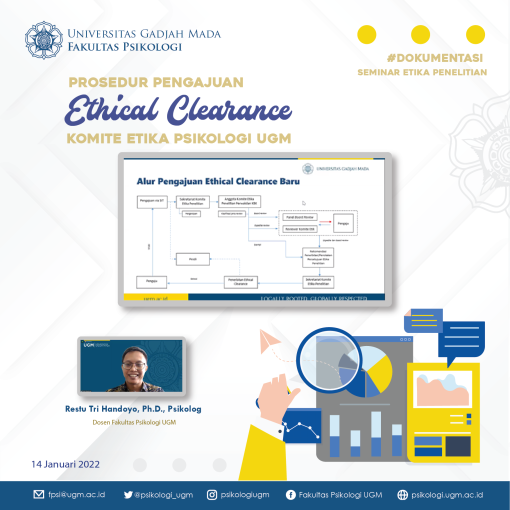
Friday (14/1) the Ethics Committee of the Faculty of Psychology UGM in collaboration with the UGM Psychology Doctoral Study Program held a research ethics seminar. This event took the title “Procedure for Submission of Ethical Clearance of the UGM Psychology Ethics Committee”. This event is part of an intensive course related to research ethics which is intended primarily for doctoral students of the Faculty of Psychology UGM but is also open to the entire academic community of the Faculty of Psychology UGM.
The event took place from 9.00 AM until 11.00 AM. This event was attended by 100 participants. The speakers at this event were Restu Tri Handoyo, Ph.D., Psychologist, Lecturer and Head of the Ethics Committee of the Faculty of Psychology UGM. For two hours Restu presented about the position of research ethics in psychological research in general to the mechanism for submitting ethical clearance at the UGM Faculty of Psychology.
In the first session, Restu introduced the Research Ethics Committee of the Faculty of Psychology UGM, including its functions and scope. By introducing the Research Ethics Committee more closely, it is hoped that it will provide a deeper understanding to participants so that it is hoped that it will be a means to facilitate the submission of ethical clearance before carrying out research.
At this meeting Restu also clarified that the Research Ethics Committee works according to applicable standards and procedures. Restu also explained that the review time for each study was different, some were fast and some were long. Some cases of applying for ethical clearance do take a long time because the review process requires thoroughness to ensure that the research is safe for both participants and researchers.
“When we process our application, it makes sense. Not too long either. It’s just that there are also cases that need further handling, further progress, so the process will take a while,” explained Restu.
The existence of a Research Ethics Committee is really needed and has a central role in the academic sphere. Restu explained that the Rector’s Regulation No. 15 of 2017 concerning the academic standards of Gadjah Mada University and the Dean’s Decree number 128/UN1.FPsi/KPT/SDM 2020 concerning the Obligation to Submit Research Ethics Approval Letters (ethical clearance) in Collecting Student Final Project Research Data as the basis the establishment of the Research Ethics Committee within the UGM Faculty of Psychology.
Restu said that the ethics committee holds the principles of independence, competence, facilitation, transparency and accountability. This is to ensure the professionalism of the ethics committee’s performance so that the results of the review of the research proposal remain objective. Restu gave several examples of cases that can be used as an illustration of how the Research Ethics Committee will work later.
“When the reviewer, the lecturer who is the reviewer submits an ethical clearance application, then we transfer it to another reviewer,” explained Restu while also giving an example if there is a lecturer member of the Research Ethics Committee reviewer who has mentored students who will submit research, then the review process will be transferred to reviewers who are not related to the research so that the results of the review remain independent.
The process for applying for ethical clearance at the Research Ethics Committee will change this year. If the existing system is the applicant submits ethical clearance for review by sending research drafts and other files via email, then for the new system the applicant can apply for ethical clearance through the Sistem Informasi Terintegrasi (SIT).
With this system change, it is hoped that the submission of ethical clearance applications will become easier. Applicants can also observe the review process through the colors and descriptions listed in the submission column so that the applicant can understand what must be done immediately. In the end, applicants can also download an ethical clearance letter independently when their research has been approved by the Research Ethics Committee.
